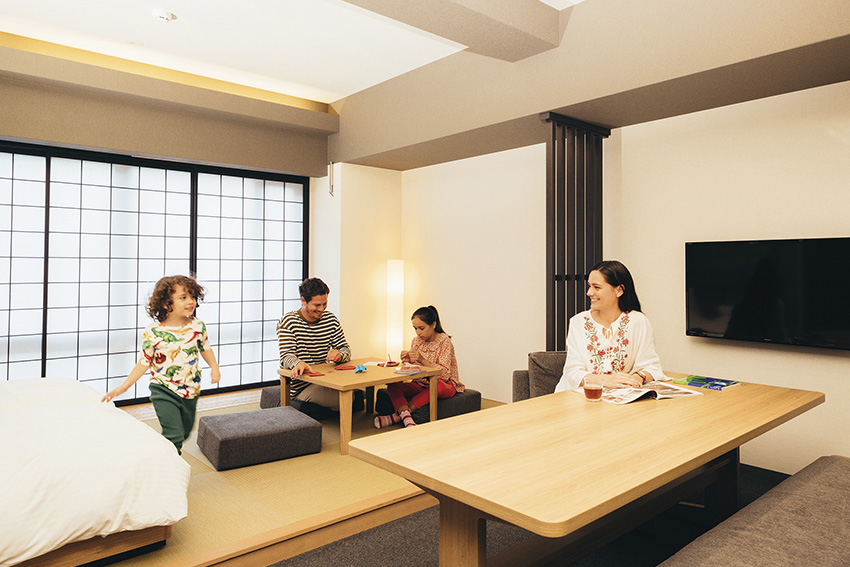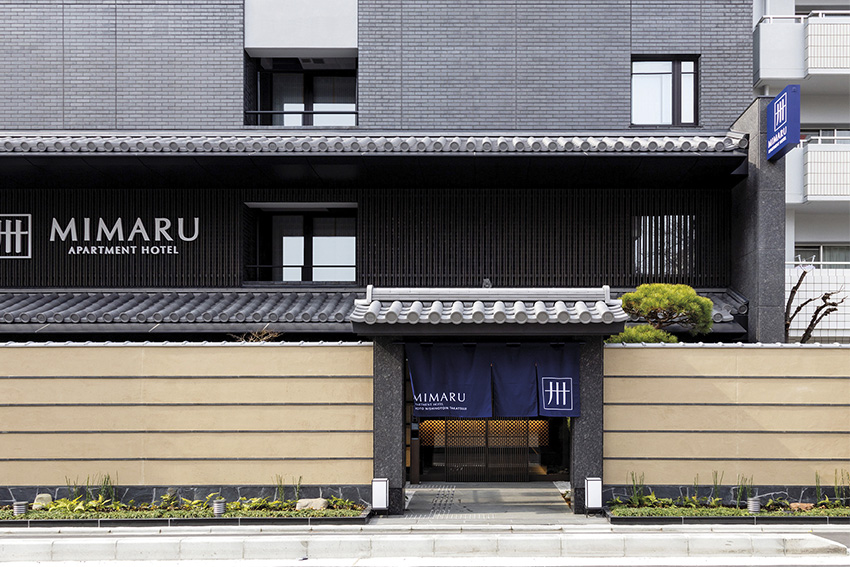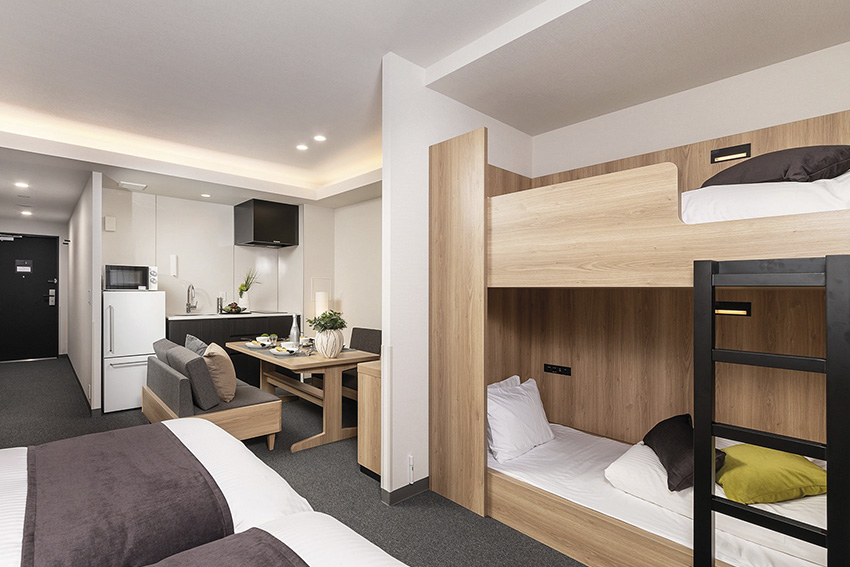Japan initially set a goal of welcoming 60 million inbound visitors by 2030, but this focus has also shifted toward quality over quantity. Your brand, MIMARU, seems uniquely aligned with this approach, offering upscale, family-oriented apartment-style accommodations. Can you tell us about this niche MIMARU is developing and why you feel it is important?
This niche is important to us because it aligns perfectly with what many international families are looking for—spacious, comfortable accommodations where they can stay together and feel at home. Hotels in urban areas in Japan are often compact, which can be challenging for families, especially those with young children or extended family members traveling together.
Our apartment-style hotels offer kitchens, living areas, and multiple bedrooms, allowing guests to relax and enjoy their stay in a way that suits their lifestyle. By focusing on comfort, space, and family-friendly amenities, we’re able to provide a high-quality experience that goes beyond standard accommodation—something that resonates strongly with today’s inbound travelers.
Who are your customer base and the type of guests you’re targeting?
Approximately 90% of our guests are families, and about 90% of those are families with children. Everything we do revolves around that core demographic. Even when inbound tourism to Japan was still limited, we anticipated its future growth and began planning accommodations specifically tailored to international travelers.
We noticed a clear gap in the market: very few hotels truly catered to families. That insight became the foundation of our approach. As it happened, inbound tourism began to surge just as we launched. In our first year, we opened five hotels—and within that same year, three of them were ranked among TripAdvisor’s top 20 hotels in Japan. That early recognition helped us quickly build a strong reputation among international travelers.
Today, MIMARU holds the number two spot in TripAdvisor’s “Hotels and Ryokan in Japan” category. The top-ranked property is a ryokan, which effectively makes us the number one hotel in the country.
Whether 150 years ago or today, Japan continues to captivate travelers with its cultural depth and stunning natural beauty. From your perspective, what makes Japan such a compelling destination?
Japan is renowned for its incredible food and safety—two things that are especially important for families traveling with children. Guests often tell us how much they appreciate how easy it is to navigate Japan with strollers, how clean the streets are, and how friendly the people are.
Many describe Japan almost like a wonderland. Its family-friendly appeal goes beyond the rich culture and spotless cities—it’s also found in the little things. One of the biggest surprises for many visitors is just how easy it is to find affordable, high-quality meals on the go. Whether you’re strolling through a quiet neighborhood or passing through a busy train station, you’re never far from a convenience store stocked with fresh, flavorful options. From perfectly packed bento boxes to onigiri, sandwiches, and seasonal sweets, even a quick snack run can feel like a miniature culinary adventure—something families, especially those used to more limited options back home, truly appreciate.
Adding to this charm is Japan’s global cultural reach. The worldwide popularity of anime has brought a new wave of interest, particularly among younger travelers and families, making the country feel even more inviting and exciting for visitors of all ages.
Do you think social media has played a role in increasing interest in authentic Japanese cuisine, or washoku?
Washoku certainly remains a major draw for international visitors, but since many of our guests are families with children, they’re not usually seeking out high-end or formal Japanese restaurants. Instead, they tend to look for more relaxed, family-friendly dining options. Recently, social media platforms like Instagram and TikTok have made it easier than ever to discover casual Japanese eateries that are both approachable and delicious, helping families feel more confident exploring local food. Our staff also actively listen to each guest’s needs and preferences, offering tailored recommendations to ensure they enjoy the best dining experiences during their stay.
In addition to operating MIMARU, our company recently launched a new service called ANO-NE, which offers a safe, engaging play environment where children can have fun under the supervision of trained staff. This allows parents to take time for themselves—whether that’s enjoying a fine dining experience, relaxing, or exploring the city—knowing their children are well cared for. By offering this kind of support, we aim to create a more holistic and stress-free experience for family travelers.
MIMARU SUITES Tokyo in Asakusa supports unique cultural experiences, including rickshaw rides, sushi-making classes, and children’s art workshops. How important are these kinds of experiences for your guests?
These authentic experiences are incredibly popular with our guests and are also a key part of our sustainability initiatives. We believe that when guests engage with local people, it creates meaningful value and contributes to revitalizing communities. We support hands-on activities like calligraphy sessions, traditional rope tying, and even opportunities to participate in local festivals. One example is gold leaf art—our staff tried it first, enjoyed the experience, and then introduced it to our guests. These interactions not only leave a lasting impression, but also foster mutual understanding and help guests appreciate the unique charm of each neighborhood. Our staff are encouraged to share personalized recommendations based on their own experiences, deepening the connection between guests and the local culture. stay.


You’ve also partnered with Joyner in Osaka to offer tours led by local residents. How do these community-based experiences enhance your approach to hospitality?
We believe it’s incredibly valuable for guests to connect with the local community, and these connections are also a key part of our sustainability initiatives. Rather than offering scripted hospitality, we focus on casual, friendly interactions that feel authentic. Our staff are encouraged to share personalized recommendations based on their own experiences, helping guests discover the unique charm of each neighborhood. These meaningful encounters not only enrich the travel experience but also contribute to revitalizing local communities and fostering mutual understanding—creating a lasting, positive impact on both tourism and regional development.
Is there a particular tour you recommend?
In fact, there’s no set list of recommendations. We don’t provide our staff with a script or manual—we empower them to tailor each experience to the individual guest. That way, every visitor receives something personal and unique.
Japan’s hospitality sector is navigating demographic shifts that affect both the domestic customer base and the labor force. You’ve partnered with Online Travel Agencies (OTAs) like Expedia and Agoda to attract international visitors. Are you looking to further expand these partnerships?
We recognize the importance of partnerships with Online Travel Agencies (OTAs), especially given our focus on a global audience. Initially, we saw these relationships as essential, but over time we’ve observed that commission fees have steadily increased—sometimes to the point of exceeding our own profit margins.
While we’ll continue working with OTAs, we’re also placing greater emphasis on promoting direct bookings through our own website.


Taiwan and Singapore are key source markets for travelers, along with the U.S. and Australia. Have you noticed any differences in behavior or preferences between Asian and Western guests?
Guests from Asia typically stay for about three to four nights, whereas around 45% of our Western guests stay five nights or more. That said, regardless of where they’re from, families tend to come well-prepared. Contrary to popular belief, most guests—especially those traveling with children—arrive with detailed itineraries and plans.
International travel as a family can be stressful, and in 2023, 20% of foreign visitors reported experiencing language barriers when interacting with hotel staff. You’ve introduced a “Travel Style Finder” tool to help guests personalize their trips—can you tell us more about how it works and what kind of experience it’s designed to create?
We created the Travel Style Finder to help guests plan memorable trips based on their individual preferences. By answering a few questions about their usual travel habits and what they’re hoping to experience this time, guests receive tailored tips and recommendations drawn from real experiences shared by past guests and our staff. Over time, MIMARU has naturally earned a strong reputation as a kid-friendly hotel—largely through word of mouth—and we’ve fully embraced that identity. Rather than relying on aggressive sales tactics, we focus on building trust through organic growth. On our website, we share kid-friendly videos and stories so that families can get a feel for the experience and feel welcomed even before they arrive.
Your workforce is remarkably diverse—over 80% of your staff are foreign nationals, and 93% of your managers are foreign-born. Do you plan to continue hiring internationally? If so, which countries or regions are you focusing on?
Absolutely. Communication is a major concern for many travelers, and our diverse team plays a key role in addressing that. Currently, our staff comes from 38 different countries and regions, and while we don’t focus on nationality in our hiring practices, we view diversity as a key asset. Many of our team members are trilingual—fluent in English, Japanese, and their native languages—allowing us to provide a welcoming and supportive experience for guests from around the world.
One guest story really stands out: A mother arrived early with her children and was visibly anxious. At first, communication was difficult, but one of our staff members realized they shared the same native language. The guest was so relieved, she burst into tears and hugged the staff member. That’s the kind of emotional connection we strive to create.
MIMARU has achieved remarkable success since its founding in 2017. As president, what are your personal goals for the company before eventually passing the baton to the next generation?
My goal is to redefine hospitality in Japan. When we started, the industry was heavily focused on traditional omotenashi—a style of service that’s formal and scripted. But I had my doubts about that approach. From day one, I encouraged our staff to simply talk with guests and make them feel at home. The response was overwhelmingly positive.
Today, we’ve even noticed staff from well-known ryokan staying at our hotels—perhaps to observe what we’re doing. Many of our reviews highlight our hospitality and the warmth of our staff as the most memorable part of the stay. That’s what I want MIMARU to be known for: a friendly, human-centered approach to service.
We’re also exploring new services, such as baggage delivery from the airport, childcare options, and family-friendly day trips. For instance, in Kyoto, traditional temple tours might not appeal to children, so we’re working on tours designed with families in mind. In Tokyo, some guests are interested in visiting salons in Harajuku, but language barriers can make booking difficult. That’s why we’re considering concierge-style services that guests can access in advance—even before they arrive in Japan.
For more information, please visit their website at: https://www.cigr.co.jp/chm/en/index.html
To read more about COSMOS Hotel Management, check out this article about them

AloJapan.com